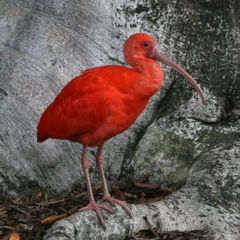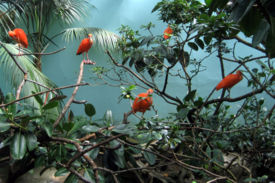Eudocimus ruber (Scarlet Ibis): Difference between revisions
imported>Caesar Schinas m (Bot: Update image code) |
mNo edit summary |
||
| (2 intermediate revisions by 2 users not shown) | |||
| Line 16: | Line 16: | ||
| species = '''''E. ruber''''' | | species = '''''E. ruber''''' | ||
| binomial = ''Eudocimus ruber'' | | binomial = ''Eudocimus ruber'' | ||
| binomial_authority = [[Carolus Linnaeus|Linnaeus]], | | binomial_authority = [[Carolus Linnaeus|Linnaeus]], 1758 | ||
}} | }} | ||
The '''Scarlet Ibis''' (''Eudocimus ruber'') is a species of ibis that occurs in tropical [[South America]] and Trinidad and Tobago. It is the national bird of [[Trinidad and Tobago]] and is featured on their [[coat of arms]] along with the Rufous-vented Chachalaca. | The '''Scarlet Ibis''' (''Eudocimus ruber'') is a species of ibis that occurs in tropical [[South America]] and Trinidad and Tobago. It is the national bird of [[Trinidad and Tobago]] and is featured on their [[coat of arms]] along with the Rufous-vented Chachalaca. | ||
| Line 24: | Line 24: | ||
This species is very closely related to the American White Ibis and is sometimes considered conspecific with it. | This species is very closely related to the American White Ibis and is sometimes considered conspecific with it. | ||
While the species may have occurred as a natural vagrant in southern [[Florida]] in the late 1800s, all recent reports of the species in North America have been of introduced or escaped birds. Eggs from Trinidad were placed in White Ibis nests in Hialeah Park in 1962, and the resulting population hybridised with the native ibis, producing "pink ibis" that are still occasionally seen. | While the species may have occurred as a natural vagrant in southern [[Florida (U.S. state)|Florida]] in the late 1800s, all recent reports of the species in North America have been of introduced or escaped birds. Eggs from Trinidad were placed in White Ibis nests in Hialeah Park in 1962, and the resulting population hybridised with the native ibis, producing "pink ibis" that are still occasionally seen. | ||
==Physical description== | ==Physical description== | ||
| Line 35: | Line 35: | ||
The scarlet ibis is a vivid scarlet bird (50 cm) with a curved bill. The sensitive bill is used to search for food, mainly small animals in the mud along the coast. | The scarlet ibis is a vivid scarlet bird (50 cm) with a curved bill. The sensitive bill is used to search for food, mainly small animals in the mud along the coast. | ||
The scarlet ibises live in large groups and fly in V-formation from their roosts to their feeding grounds. They contrast splendidly with the normal green color of the landscape, the brown of the mud flats and the blue of the sky. The young are brown with a white rump and belly. | The scarlet ibises live in large groups and fly in V-formation from their roosts to their feeding grounds. They contrast splendidly with the normal green color of the landscape, the brown of the mud flats and the blue of the sky. The young are brown with a white rump and belly.[[Category:Suggestion Bot Tag]] | ||
Latest revision as of 06:00, 14 August 2024
| Scarlet Ibis | ||||||||||||||||
|---|---|---|---|---|---|---|---|---|---|---|---|---|---|---|---|---|
 Seen at the San Diego Zoo
| ||||||||||||||||
| Conservation status | ||||||||||||||||
| Scientific classification | ||||||||||||||||
| ||||||||||||||||
| Binomial name | ||||||||||||||||
| Eudocimus ruber Linnaeus, 1758 |
The Scarlet Ibis (Eudocimus ruber) is a species of ibis that occurs in tropical South America and Trinidad and Tobago. It is the national bird of Trinidad and Tobago and is featured on their coat of arms along with the Rufous-vented Chachalaca.
Adults are 56-61 cm long and weigh 650g. They are completely scarlet, except for black wing-tips. They nest in trees, laying two to four eggs. Their diet includes crustaceans and similar small marine animals.
This species is very closely related to the American White Ibis and is sometimes considered conspecific with it.
While the species may have occurred as a natural vagrant in southern Florida in the late 1800s, all recent reports of the species in North America have been of introduced or escaped birds. Eggs from Trinidad were placed in White Ibis nests in Hialeah Park in 1962, and the resulting population hybridised with the native ibis, producing "pink ibis" that are still occasionally seen.
Physical description
Body length 22 to 24 inches (56 to 61 centimeters) Color is bright red in both sexes, with a long neck, long curved probing bill, black tipped feathers, and perching feet that are only slightly webbed. .
General information
The Scarlet Ibis is one of the most striking sights in the world of birds, flying, feeding and nesting in large groups. Some birds, especially those in the tropics, stay in the same general area throughout life. The Scarlet Ibis is classified with other birds of tropical America who have few or no close relatives except in other tropical regions.
The scarlet ibis is a vivid scarlet bird (50 cm) with a curved bill. The sensitive bill is used to search for food, mainly small animals in the mud along the coast. The scarlet ibises live in large groups and fly in V-formation from their roosts to their feeding grounds. They contrast splendidly with the normal green color of the landscape, the brown of the mud flats and the blue of the sky. The young are brown with a white rump and belly.


